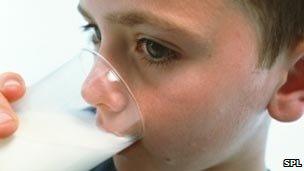Why give milk to children?
- Published

Milk is packed with the nutrients children need
The government has backed down on proposals to scrap free milk for children aged under five.
Number 10 rejected the idea despite Health Minister Anne Milton insisting the policy was "outdated", "ineffective" and too expensive.
For Prime Minister David Cameron, it should save him being labelled a "milk-snatcher" like his predecessor Margaret Thatcher.
But is this political move based on sound science?
The Nursery Milk scheme, which allows children in approved day care to receive 189ml or a third of a pint of milk free each day up until their fifth birthday, dates back to the wartime years of 1940.
The idea was to give children an extra nutritional boost at a time when food was in short supply and rationed.
But today, food is in plentiful supply and childhood obesity is on the rise.
Ms Milton has said there is "no good evidence" that free school milk improves the health of our nation's children.
She believes the Β£50m scheme should be scrapped and instead low-income families should be given extra vouchers to buy not just milk, but fruit and vegetables too.
The government, however, maintains that free milk for under fives should stay.
So why is milk deemed so important for children?
Part of the reason is that it is what experts call "a nutrient dense food", which means it provides a large amount of nutrients essential for growth, yet with relatively few calories.
Nutrient rich
Milk is a good source of protein, zinc and vitamins A, B2 (riboflavin) and B12, and makes a valuable contribution to the intake of iodine, niacin and B6.
It is also rich in calcium, which children need for strong bones. A third of a pint of milk provides half the daily recommended amount of calcium a child aged four to six years needs.
But dairy foods are not the only sources of calcium. White bread, fish, leafy green vegetables, dried fruit and nuts, and seeds provide it too.
The challenge, however, is getting children to eat enough of the right foods to get the nutrients.
Bridget Benelam of the British Nutrition Foundation said: "It can be difficult for parents to get their children to eat lots of green, leafy veg.
"While other foods such as tofu, soya beans and green leafy vegetables also provide calcium, it is more difficult for the body to absorb and it may be difficult for young children to consume enough of these foods to provide all the calcium they need."
This is why many advocate providing free milk in schools, arguing that it is the "original fast food", being a quick and nutritious snack.
Quick fix
With one child in three in Britain going to school without breakfast, a glass of milk in the morning can provide a much-needed boost, says the School Milk Campaign.
But milk also contains saturated fat, which is linked to weight gain and heart disease.
Experts still recommend whole milk for children between the ages of one and two years.
But they say from two years onwards semi-skimmed milk can be gradually introduced.
Skimmed and 1% milks are not suitable for children until they are at least five years old because they have less vitamin A and are lower in calories.
However, not all children will like or be able to tolerate milk.
A small number of children - 2-3% of UK infants - are allergic to milk and will need to avoid it completely, says the Dairy Council.
And some people as they get older have difficulty digesting lactose, the sugar found naturally in milk.
It is estimated that about 5% of the UK population - mainly people from Asia, Africa, India and the Middle East - has lactose intolerance.
For them, drinking milk causes bloating, abdominal pain and diarrhoea.
So while it may not be the best policy for some, experts tend to agree that it may be the best option for most.
Professor Ian Gilmore, of the Royal College of Physicians, told the Βι¶ΉΤΌΕΔ's Today programme that it was hard to gather cast iron evidence to support the policy.
But, nonetheless, he said it did make sense in public health terms to give free milk to young children and said it is a policy he backs.
GP Dr Sarah Jarvis agrees. She says: "It's hugely valuable if they are not getting it elsewhere.
"This is the real key. We are not in the same position that we were in 1940. There is no such thing as a child in this country whose parents absolutely cannot afford to give them that [milk].
"But there are so many pressures on parents and I think understanding from some parents about nutrition is so poor that many children are just not getting it.
"In terms of building bones it's absolutely key."
She said that for children who do not get a balanced diet high in fruit and vegetables and foods like fish, milk was the only real way of them getting enough calcium.
- Published8 August 2010
- Published8 August 2010
- Published8 August 2010